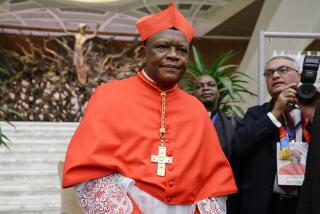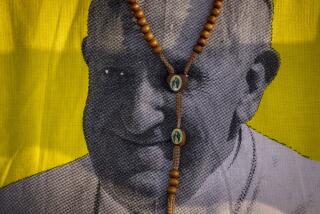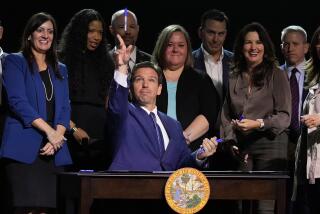Bishops Call Contra Aid Policy ‘Morally Flawed’
- Share via
WASHINGTON — The nation’s Catholic bishops said Thursday that the Reagan Administration policy of support for the Nicaraguan Contras is “morally flawed” and that “we should not use Central American lives as pawns in a superpower struggle.”
In their policy paper adopted overwhelmingly, the bishops thus underscored their periodic statements and congressional testimony opposing U.S. attempts to undermine the Marxist-oriented Sandinista government in Nicaragua. “There is no politically or morally acceptable military solution,” the bishops declared on the last day of their annual meeting here.
The statement applauded the regional peace plan proposed by Costa Rican President Oscar Arias Sanchez and the roles of Nicaraguan Cardinal Miguel Obando y Bravo and Salvadoran Archbishop Arturo Rivera y Damas “to mediate and advance the process of negotiations.”
The only serious opposition among the bishops concerned the timing of its release. Fearing that issuing a policy statement now would disturb delicate negotiations, Cardinal Bernard Law of Boston proposed to discard the policy statement and approve instead a short statement of support for the peace plan.
Law said the American church is “running the risk of one party or another manipulating our statement for their own propaganda purposes.”
However, Law’s motion was defeated, as was a later one to postpone action.
Los Angeles Archbishop Roger M. Mahony, who was part of the committee that prepared the document, told the bishops that the committee met with the Central American bishops in late July and received their concurrence.
“I think we owe the bishops and local church in Central America broader support,” Mahony told the assembly here. The policy paper concluded that violence, human rights violations, corruption, unemployment and other miseries have brought the region “to the very brink of devastation.” The nearly exclusive U.S. government attention to Nicaragua, the bishops said, amounts to “a skewed and inadequate approach.”
The political issues “should be taken up directly with the principal sources of U.S. concern, the Soviet Union and Cuba,” the paper said.
Aid to Refugees
Without backing the controversial sanctuary movement to shield Central American refugees, the bishops urged parishes and Catholic agencies to “increase their already commendable assistance to refugees in need, regardless of their standing before the law.’
In other deliberations Thursday, the lack of a quorum aborted the bishops’ debate on guidelines, seven years in the making, for resolving disputes between theologians and local bishops. Only 172 bishops of the nearly 300 that came here remained as the meeting near its scheduled end.
The measure was developing opposition, however. Denver Archbishop J. Francis Stafford declared that the document, even as amended, was “seriously flawed” in its descriptions of the bishops’ authority and the responsibilities of scholars to serve the church.
The four-day meeting was characterized as a “placid” one by St. Louis Archbishop John L. May, president of the National Conference of Catholic Bishops. Bishops also approved Thursday a rite for weddings of Catholics with other Christians. Earlier, the bishops voted for an annual national relief collection for aged nuns, adopted a pastoral plan for Latino Catholics and strongly objected to public school-based health clinics that dispense contraceptives in efforts to curtail the teen-age pregnancy rate.
More to Read
Sign up for Essential California
The most important California stories and recommendations in your inbox every morning.
You may occasionally receive promotional content from the Los Angeles Times.












